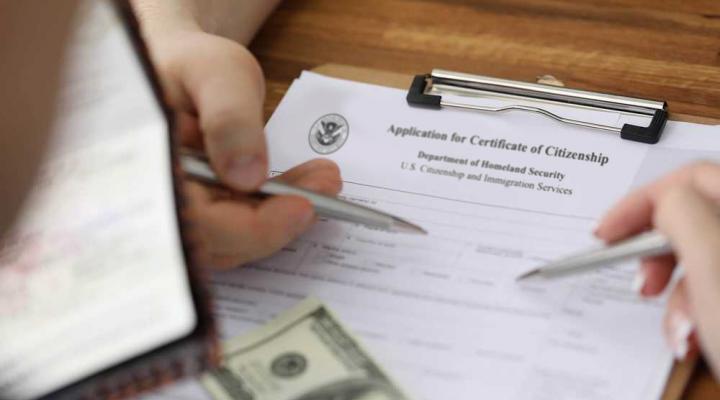Costs Involved in the U.S. Citizenship Application Process

[Note: This article has been updated to reflect the USCIS fee changes as of April 1st, 2024.]
Unless you qualify for a fee waiver, you can expect to pay government application fees. You’ll likely need to work with people who can assist you through the process, and that can add to the cost. But don’t worry. We understand you may have real concerns about costs and we are here to help.
There are many ways to reduce your overall costs. And there are many ways to fund these costs, in addition to cash, family and credit cards. In this article, we’ll share with you what costs are involved and how you can minimize them.
Application Fees for Citizenship Range from $380-$760
If you file a paper application (form N-400) your cost will be $760. If you file an online application the fee is reduced by $50 and you will pay $710. If you qualify for a reduced fee, then you can expect to pay $380. The good news is you no longer have to pay a separate fee for biometrics. It is included in the N-400 fee. USCIS has a helpful fee calculator you may find useful during the process.
If you are in one of the following categories, your costs can be reduced or eliminated:
- If your documented annual household income is not more than 400 percent of the Federal Poverty Guidelines and you submit supporting documentation with your N-400 application, you can qualify for a fee reduction to $380.
- If you are active-duty military or a veteran, your application is free.
- If you apply for and receive a fee waiver, your application is free.
Are you taking the lead to help other family members become citizens, too? That’s great! Just be aware, each member of your household age 18 or older also seeking citizenship needs to file an application and pay the appropriate fee. Be sure you know what application and fees will be required based on the status of each family member. Once you become a US citizen, your minor children may be eligible to become citizens, as well. Keep in mind, in many cases, these minor children do not need to request US citizenship. Rather, it is automatically conferred when either parent naturalizes if certain requirements are satisfied.
You May Qualify for a Fee Reduction or Waiver
It is possible to have your citizenship application cost reduced or eliminated. Here’s what you need to know:
U.S. Citizenship Application Fee Reduction
To apply for a fee reduction, you need to use the new N-400 form* (download from USCIS) and submit a paper application. As of April 1st, 2024 online fee reduction processing is not yet available. Be sure to fill out part 10 of the new N-400 form and provide all supporting material requested. To qualify, you must demonstrate that your total annual household income is no more than 400% of Federal Poverty Guidelines. If you meet the qualifications, you will send the $380 fee with your completed N-400 form, along with any supporting documentation.
If your application is denied, you’ll receive a notice to resubmit the application with the proper fee. The reduced fee payment you sent will be returned with the entire application to be resubmitted with proper payment.
U.S. Citizenship Application Fee Waiver
To apply for a fee waiver, you need to file Form I-912 with supporting material and Form N-400. Receiving approval for a fee waiver is more common than you think. On average 80% of all USCIS fee waiver requests are approved. On an annual basis, close to 20% of all citizenship applicants receive an approved fee waiver.
To qualify, you must demonstrate that your total annual household income is at or below 150% of Federal Poverty Guidelines or that you have a significant financial hardship, such as medical expenses, unemployment or you receive a means-tested benefit. See USCIS site for examples of means-tested benefits.
Including a fee waiver or reduction request in your application can add up to several months to the USCIS processing time and if rejected, you will have to reapply and start from the beginning. If saving time is important to you, you may want to consider using a low-interest loan as a way to pay the fees. We highly encourage those on the path to citizenship to consult a local nonprofit immigration service for assistance in applying for either a fee reduction or waiver.
Help to Prepare Your Application May Cost Extra
You may have heard the process costs thousands of dollars. Unfortunately, it can. There are numerous expenses people commonly incur that can add up to significant costs, such as application preparation assistance, legal review, document request fees, translation services and travel for appointments. (But keep reading. We’re also going to share our tips on how to reduce your costs.) From start to finish, the cost of applying for citizenship can range between $150-$2,000 (not including the USCIS application fees). Of these potential expenses, the largest is fees for professional assistance with completing USICS forms. Here are the three most commonly used application preparation services, and what you can expect to pay for them.
- Legal professionals or firms specializing in immigration:
For basic immigration legal support for form filing, expect to pay approximately $500 - $1,200 in legal fees. These fees may be reduced if you qualify for pro-bono legal services. - Online application assistance:
While hiring a lawyer is the more typical route, online assistance is an alternative option. These services, such as Citizenpath or Boundless, cost between $150-$350 for each citizenship application (not including USCIS application fees). - Nonprofit immigration service organizations: Local providers can be a great place to start and they often offer assistance for free or at a low cost. They have comprehensive services that help determine your eligibility, prepare USCIS applications and guide you to the right resources. Other costs, in addition to application preparation, are minimal yet good to know:
- Class tuition, to prepare for the English or civics tests.
- Documentation or translation fees ($20-$40 per document).
- Travel expenses to get to appointments.
- Shipping costs for submitting your application.
- Photography fees.
Free or Low-Cost Help Is Available
So, what about those tips we said we’d share? Here is our top advice to help you reduce or eliminate costs:
Tip #1: As an alternative to hiring a private attorney to assist with application preparation, you can consider using websites that offer both application and legal review. The average online legal review costs $150-$350 which is big savings over independent attorney fees. It’s important to note that more complicated cases may require additional legal assistance.
Tip #2: There are a lot of local nonprofit organizations that specialize in citizenship assistance for free or low cost. Make sure to seek out nonprofit Department of Justice (DOJ) accredited organizations, such as Project Citizenship, which offers classes and clinics, or an organization with a lawyer on staff. Visit One Percent for America's curated library of education, resources, expert services and sponsored offerings from experts and providers.
Although there are costs to becoming a US Citizen, it is attainable!
It’s important to think and plan about all the costs AND how you can pay for them as early in the process as possible. Once you know what to expect, you can make decisions that are best for you!
Don’t let cost considerations hold you back from seeking citizenship. Finance options, such as the OPA low-interest loan, can help you pay the $725 in application fees.
*Starting June 3, USCIS will accept only the new (04/01/24 edition) of N-400. Until then, you can also use the 09/17/19 E and 09/17/19 editions. You can find the edition of your form at the top left corner of the form.
Frequently Asked Questions
What are the different fees associated with the US citizenship application?
The US citizenship application process involves varying fees depending on the method of application and eligibility for fee reductions. The standard fee for a paper application (Form N-400) is $760, while online applications incur a slightly reduced fee of $710. For those who qualify for a reduced fee based on income levels, the fee is $380. It's important to note that the fee for biometrics is included in the N-400 fee.
How can I qualify for a fee reduction or waiver in my US citizenship application?
To qualify for a fee reduction, your household income must be no more than 400% of the Federal Poverty Guidelines. You must submit a paper application using the new N-400 form along with all required supporting documentation. For a fee waiver, your household income must be at or below 150% of the Federal Poverty Guidelines, or you must be experiencing significant financial hardship. The application for a fee waiver is made using Form I-912 along with the required documentation.
What additional costs should I consider when applying for US citizenship?
Aside from application fees, additional costs may include fees for professional assistance with application preparation, legal review, document request fees, translation services, and travel for appointments. Costs can range from $150 to $2,000, not including the USCIS application fees. Applicants should also consider costs for class tuition for the English or civics tests, documentation or translation fees, travel expenses, shipping costs, and photography fees.
Note: This article has been updated to reflect the USCIS fee changes as of April 1st, 2024.
The information provided on www.onepercentforamerica.org is intended for general informational purposes only. It should not be considered as professional advice or a substitute for seeking professional guidance.




